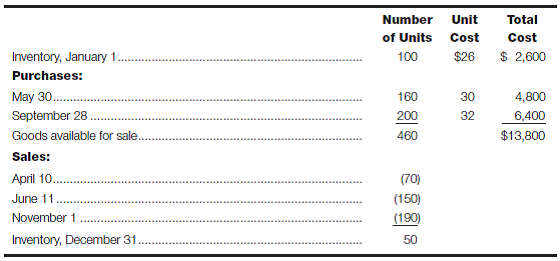
Accounting: What the Numbers Mean 11th Edition by Wayne McManus,Daniel Viele,David Marshall
Edition 11ISBN: 978-1259535314
Accounting: What the Numbers Mean 11th Edition by Wayne McManus,Daniel Viele,David Marshall
Edition 11ISBN: 978-1259535314 Exercise 26
Cost flow assumptions-FIFO and LIFO using periodic and perpetual systems The inventory records of Cushing, Inc., reflected the following information for the year ended December 31, 2016:

Required:
a. Assume that Cushing, Inc., uses a periodic inventory system. Calculate cost of goods sold and ending inventory under FIFO and LIFO.
b. Assume that Cushing, Inc., uses a perpetual inventory system. Calculate cost of goods sold and ending inventory under FIFO and LIFO.
c. Explain why the FIFO results for cost of goods sold and ending inventory are the same in your answers to parts a and b , but the LIFO results are different.
d. Explain why the results from the LIFO periodic calculations in part a cannot possibly represent the actual physical flow of inventory items.

Required:
a. Assume that Cushing, Inc., uses a periodic inventory system. Calculate cost of goods sold and ending inventory under FIFO and LIFO.
b. Assume that Cushing, Inc., uses a perpetual inventory system. Calculate cost of goods sold and ending inventory under FIFO and LIFO.
c. Explain why the FIFO results for cost of goods sold and ending inventory are the same in your answers to parts a and b , but the LIFO results are different.
d. Explain why the results from the LIFO periodic calculations in part a cannot possibly represent the actual physical flow of inventory items.
Explanation
(a)The cost flow assumption of FIFO or f...
Accounting: What the Numbers Mean 11th Edition by Wayne McManus,Daniel Viele,David Marshall
Why don’t you like this exercise?
Other Minimum 8 character and maximum 255 character
Character 255


